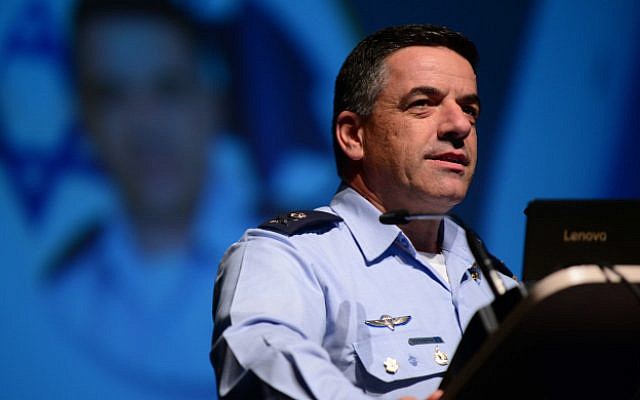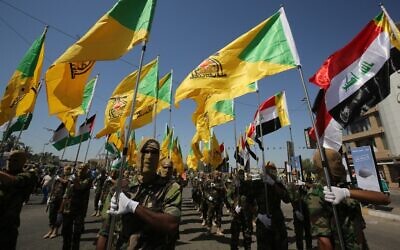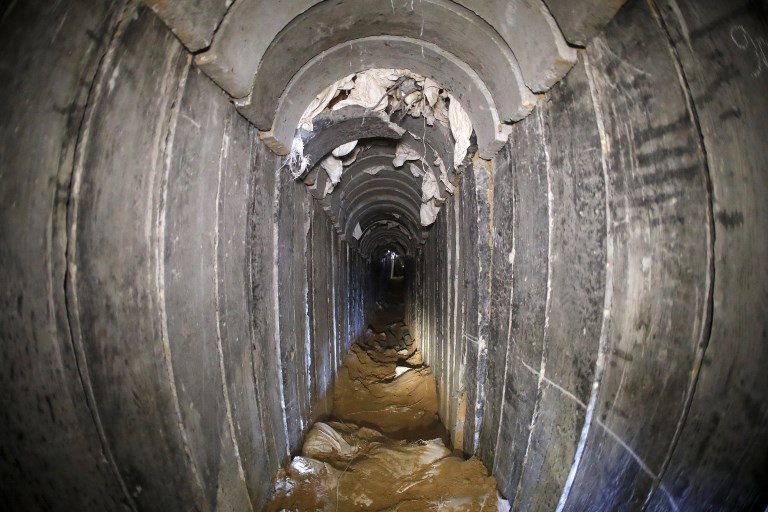Maj. Gen. Amikam Norkin lauds IDF’s aerial supremacy in the face of Syrian S-300 anti-aircraft batteries, which he says allows Israel to fight Iranian entrenchment in the region

Israeli Air Force chief Amikam Norkin on Tuesday described strikes on an Iran-backed Iraqi militia by the United States as a “potential turning point” in the campaign against Tehran.
On Sunday, the US conducted a series of airstrikes on the Iran-supported Kataeb Hezbollah in western Iraq and eastern Syria, killing at least 25 members of the militia, in response to a rocket attack two days prior on an Iraqi military compound that killed an American contractor and injured several American and Iraqi soldiers. US President Donald Trump on Tuesday indicated that the United States held Iran directly responsible for the rocket attack last Friday.
Israeli officials have recently lamented that the Jewish state was alone in the fight against Iran in the Middle East.

“The American strike two days ago in Iraq is a potential turning point,” Norkin said, speaking at a conference hosted by the Calcalist financial newspaper.
Israel’s air force chief did not elaborate on how he believed the US might continue to act against Iran in the region.
In his speech, Norkin touted the Israel Defense Forces’ aerial superiority as a critical feature of the country’s national security strategy, especially in the current state of affairs, which Israeli officials refer to as the “war between wars,” when the IDF conducts regular operations against its enemies without it rising to the level of all-out conflict.
“Aerial superiority is the key to regional stability,” Norkin said. “Through our aerial superiority we are able to radiate strength.”
He noted that the IAF, despite being dominant in the region, still faces considerable challenges.
“My mission, when I wake up in the morning, is to preserve the freedom of operation of the air force, the freedom of the IDF to operate in different arenas — and this is becoming more and more challenging,” he said.

“In the north, we face one of the most densely packed surface-to-air missile arrays in the world: SA-2, SA-6, SA-8, SA-17, and in the last year, also S-300 and S-400,” Norkin said, referring to a suite of Russian-made air defense batteries.
In mentioning the S-300, a powerful air defense system that Russia gave to Syria last year, the air force commander appeared to confirm that the anti-aircraft weapon was operational, as has long been suspected.
“In no other place in the world does an air force deal with these types of threats,” Norkin said.
He said he had worked extensively with the Russian military, which operates within Syria in support of dictator Bashar Assad, in order to preserve Israel’s freedom of operation there. According to Israeli officials, the IDF has conducted hundreds if not thousands of airstrikes in Syria against Iranian-linked targets, as Tehran seeks to establish a significant military presence in the country, something Israel has vowed to prevent.
“Thanks to our war between wars, we are able to strike weapons that are trying to be brought into the region, balance-shifting weapons, systems that threaten us. We are striking crates at the airport, shipments,” he said.
Norkin boasted that in the past few years the IAF has also developed weapons and techniques that allow it to bomb the attack tunnels dug by terror groups from the Gaza Strip into southern Israel, including at least one at a depth of 25 meters (82 feet).
“We are succeeding in striking underground [facilities],” Norkin said.
“Most of the tunnels that were dug from Gaza into Israel were hit from the air, something that was not at our disposal in previous years,” he said.

Norkin hailed the air force’s ties to foreign militaries, which he said both strengthen its own operations and also have positive effects in the realms of diplomacy and economics, as they improve Israel’s global standing.
“We work in a network. We have an ability to operate in the airspace of Cyprus, to train in Greece, to train with other countries, including some from the [Persian] Gulf,” Norkin said, in a rare confirmation of military cooperation with Arab countries.
During his speech, the air force chief noted the deep ties between the Israeli and American air forces. He displayed a photograph taken in the air during a recent visit by the head of the US Air Force, Gen. David L. Goldfein, of the American general flying with Norkin inside an Israeli F-15 fighter jet over Jerusalem.
The IAF commander said his branch of the military would require a significant influx of money as it upgrades its aircraft.
“The next decade will be one of force-building. We will need to replace our fleet of refueling planes. We will replace our fleet of Yasur helicopters. We will purchase additional fighter jets. We will develop new munitions. This will preserve our aerial superiority in the next decade,” Norkin said.
As reported by The Times of Israel
